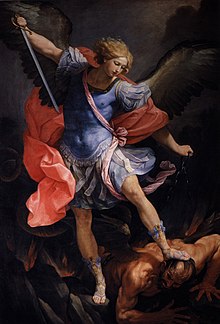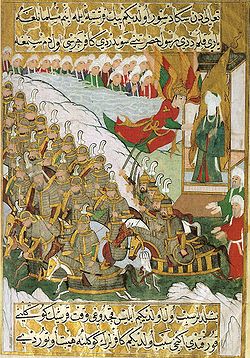Heavenly host

The Heavenly host (Hebrew: צבאות ṣəḇāʾōṯ, "armies") refers to the army (or host) of Yahweh, as mentioned in both the Hebrew and Christian Bibles, as well as other Abrahamic texts.
The Bible typically describes the Heavenly host as being made up of angels, and gives several descriptions of angels in military terms, such as their encampment (Genesis 32:1–2), command structure (Psalms 91:11–12; Matt.13:41; Rev.7:2), and participation in combat (Job 19:12; Rev.12:7). Other passages indicate other entities make up the divine army, namely stars (Daniel 4:35,Judges 5:20, Isaiah 40:26).[1][full citation needed] In Christian theology, the heavenly host participate in the war in Heaven.
Hebrew Bible
[edit]
In the Hebrew Bible, the name Yahweh and the title Elohim (literally 'gods' or 'godhood', usually rendered as 'God' in English translations) frequently occur with the word tzevaot or sabaoth ("hosts" or "armies", Hebrew: צבאות) as YHWH Elohe Tzevaot ("YHWH God of Hosts"), Elohe Tzevaot ("God of Hosts"), Adonai YHWH Tzevaot ("Lord YHWH of Hosts") or, most frequently, YHWH Tzevaot ("YHWH of Hosts"). This name is traditionally transliterated in Latin as Sabaoth, a form that will be more familiar to many English readers, as it is used in the King James Version of the Bible.[2]
In the Book of Joshua 5:13–15, Joshua encounters a "captain of the host of the Lord" in the early days of his campaigns in the Promised Land. This unnamed heavenly messenger is sent by God to encourage Joshua in the upcoming claiming of the Promised Land:
Once when Joshua was by Jericho, he looked up and saw a man standing before him with a drawn sword in his hand. Joshua went to him and said to him, “Are you one of us or one of our adversaries?”
He replied, “Neither, but as commander of the army of the Lord I have now come.” And Joshua fell on his face to the earth and worshiped, and he said to him, “What do you command your servant, my lord?”
The commander of the army of the Lord said to Joshua, “Remove the sandals from your feet, for the place where you stand is holy.” And Joshua did so.
— Joshua 5:13–15 (NRSV)
New Testament
[edit]
In the Book of Revelation, the rebellious forces of Satan are defeated by the heavenly host led by Michael the Archangel during the War in Heaven (Rev.12:7–9).
Quran
[edit]
The Quran mentions God's heavenly army (Jundallah (Arabic: جندالله) in Quran 9:40,[3][4] comparable to the heavenly host in Judeo-Christian tradition.[5] The term junud refers explicitly to hosts of spirits. The opposite is junud Iblis (the invisible hosts of Satan).[6] The Quran describes that angels have intervened during the Battle of Badr to fight against the šayāṭīn (devils)[7]
Islamic theology and philosophy understands the battle of these two hosts to occur within the human heart (Qalb) as written in the texts of Ja'far ibn Sa'id and Al-Ghazali.[8] Unlike Christianity, dualistic tendencies are usually minimized in Islamic tradition, and God is ultimately in control of both hosts; enabling a choice to side with either of these created beings.
Baháʼí Faith
[edit]The term "Lord of Hosts" is also used in the Baháʼí Faith as a title of God.[9] Bahá'u'lláh, claiming to be the Manifestation of God, wrote tablets to many of the kings and rulers of the world inviting them to recognize him as the Promised One of all ages and faiths, some of which were compiled and published in English as The Summons of the Lord of Hosts.[10]
Ugarit
[edit]Karel Van der Toorn says the Ugaritic texts put the council of heavens (dr dt šmm) in synonymous parallelism with the assembly of the stars (pḫr kkbm) and the sons of El (bn il), meaning the gods.[11]
See also
[edit]References
[edit]- ^ Dahood, Psalms II, 1968, p 141
- ^ Jewish Encyclopedia: Host of Heaven New York, May 1, 1901
- ^ Surah Al-Anfaal Ayah #09 Where ALLAH said, (Remember) when you asked help of your Lord, and he answered you, indeed, I will reinforce you with a thousand from the Angels, following one another. This Ayah affirms the statement of Ar-Rabi bin Anas in Tafsir ibn e kathir while explaining the Tafsir of Ayah no 12 of surah Al-Anfal where he said in the Aftermath of badr, the people used to recognize whomever the Angels killed from those whom they killed, by the wound over their necks, fingers, and toes because those parts had Mark as if they were branded by fire.
- ^ Sahih al-Bukhari, 1:6:315
- ^ Serdar, Murat. "Hıristiyanlık ve İslâm’da Meleklerin Varlık ve Kısımları." Bilimname 2009.2 (2009).
- ^ THE ROLE OF AL-'aql in early Islamic Wisdom with reference to Imam Jafar al Sadiq
- ^ Halverson, Jeffry R., et al. "The Battle of Badr." Master Narratives of Islamist Extremism (2011): 49
- ^ Ateşçi, Cemre. Imam al-Ghazali’s understanding of human ontology and behavior. MS thesis. İbn Haldun Üniversitesi, Medeniyetler İttifakı Enstitüsü, 2019.
- ^ The Summons of the Lord of Hosts Baháʼí Reference Library
- ^ The Summons of the Lord of Hosts, Page 1 Baháʼí Reference Library
- ^ Van Der Toorn, Karel (2017). "Celebrating the New Year with the Israelites: Three Extrabiblical Psalms from Papyrus Amherst 63". Journal of Biblical Literature. 136 (3): 633–649. doi:10.1353/jbl.2017.0040. ISSN 1934-3876.
